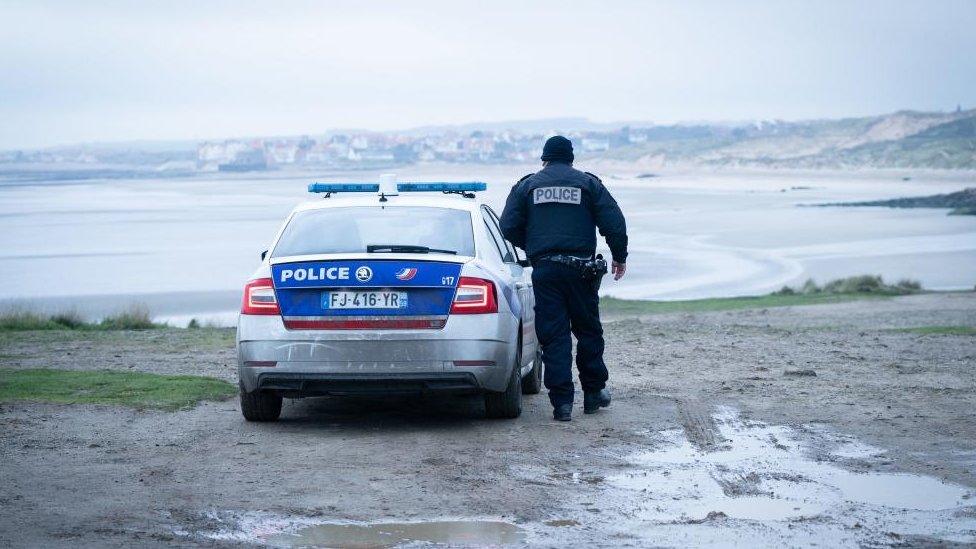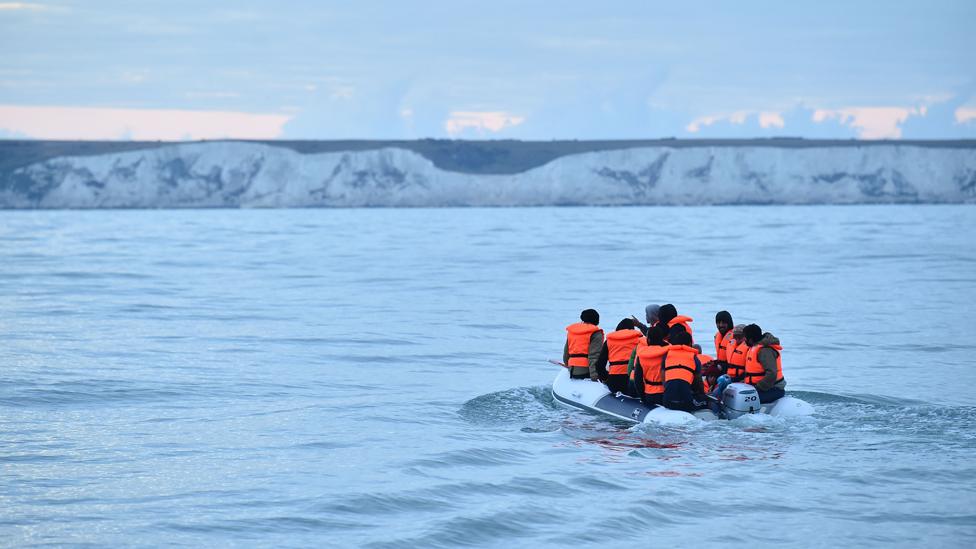Death in the Channel - what led a 14-year-old boy to make fatal journey?
- Published
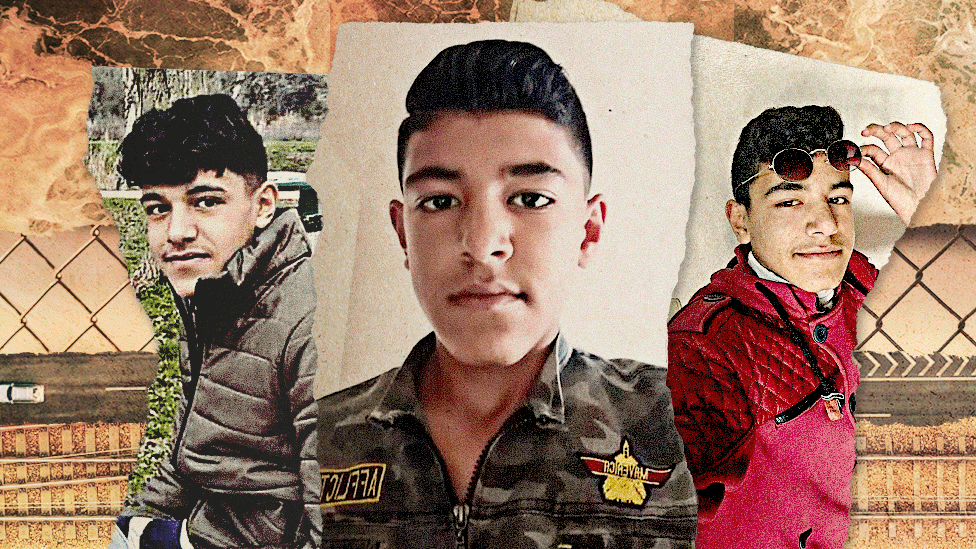
Teenage Syrian migrant Obada who died in the English Channel in January 2024
On the night he drowned, 14-year-old Obada Abd Rabbo was having doubts once again.
"I can't swim," he kept telling the men around him, as they shuffled down the wet slipway in the pitch dark, towards the icy waves.
Obada's older brother, Ayser, 24, clutched his hand.
This was the third time since leaving Syria nine months earlier that they had headed out to sea, and each time Obada had made the same anxious pleas - that he was scared, that he didn't know how to swim, that he was not sure about the journey.
Obada and Ayser were among five people who drowned, a few metres from the shore, on the coast of northern France that night - the first to die while trying to cross to the UK in a small boat in 2024, a fortnight into the new year.
To try to understand how a child could be put in this situation, the BBC reconstructed Obada's journey from Syria - using videos, messages and interviews with the brothers' relatives and others who accompanied them. Our aim was to explore the wrenching decisions involved at every stage.
We uncovered the extraordinary pressure that some children appear to be put under - by parents, relatives and smugglers alike. And we found a broader story about the motives and strategies of those seeking to reach the UK, and the impact of the deterrents which the British and other governments have introduced.

Obada and with his older brother Ayser
Over the past months, the men now surrounding Obada on the slipway - nearly a dozen of them from the same neighbourhood in Daraa, a city in southern Syria - had been trying to toughen the boy up, telling him to be strong, to look after himself, to be a man. But it wasn't helping.
It was normal for men to attempt the trip, given that women would be considered more vulnerable, not least since they would transit through war-torn Libya. But there were also two mothers with teenage children attempting the crossing that night.
By now the inflatable boat was already in the water at the end of the slipway, and some people were clambering on board. In all there were more than 60 people in the crowd around them hoping for a place - far too many to fit safely. The smugglers had handed out motorcycle inner tubes as flotation devices with instructions not to inflate them until the boat was on its way to England.
The ebbing tide quickly began tugging at the boat, pulling it away from the slipway and out towards deeper water. It was early on Sunday 14 January and the wind had dropped enough for the smuggling gangs to attempt to launch their first crossings of 2024.
Soon there was a frantic scramble as people rushed into the sea trying to get on the boat as it drifted from the shoreline. And in the growing chaos came a deepening sense of confusion.
This wasn't the typical wide beach that they had all seen along the northern French coast. Instead, the smugglers had brought them to the centre of Wimereux, a small resort town just north of the port of Boulogne, and to a slipway in the middle of a substantial sea wall, at high tide.
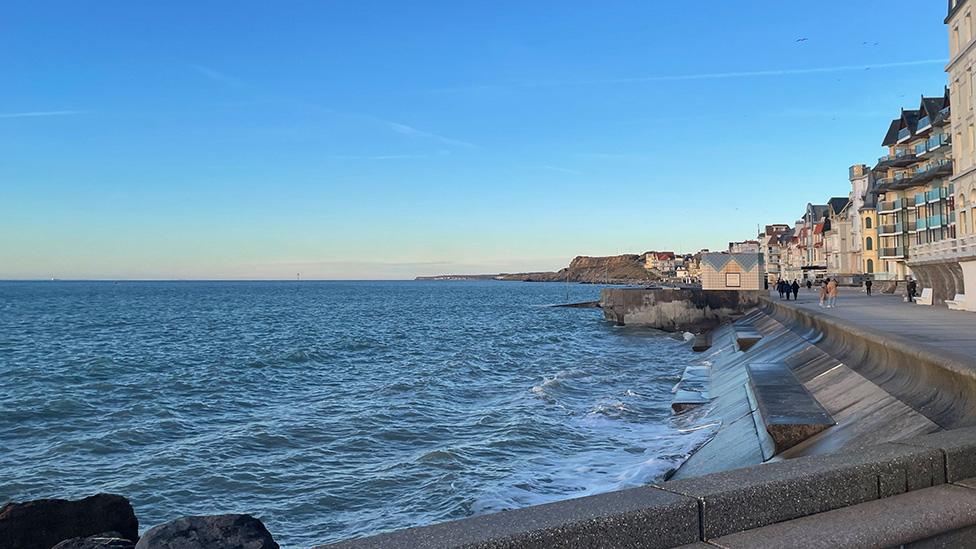
The sea wall at Wimereux, near Boulogne
There was no shallow surf to wade through as they sought to board the retreating boat, but instead a steep drop from the sides of the slipway into deep water.
"It's not what we expected," said one of the survivors.
In his bedsit in west London, another of Obada's brothers, Nada, 25, kept glancing at his phone. It was 01:00 in London, 02:00 in France.
A few hours earlier, Nada had called the whole group as they sat warming themselves around a fire at their makeshift camp under a canal bridge in Calais. They'd seemed confident about the journey ahead.
Even Obada, wearing a dark knitted hat and blue scarf, had grinned, and held up two fingers to the camera in a victory sign. Their long, difficult journey was so nearly over.
Friends sit around a fire before attempting their journey to the UK
Nada had made the same dangerous crossing two years earlier, ignoring his father, at home in Daraa, who had initially urged him to be patient, suggesting the war in Syria might soon end.
"But we've waited for 12 years, and it is not finished. There's no safety. There was no (other) way to ask for asylum," Nada remembers telling his father. Nada is a bearded, soft-spoken man, and tall, like all his brothers.
Nada had chosen to travel to England because an uncle had already made the journey almost a decade earlier and been granted permission to remain. Both men had come illegally because, Nada said, there was no alternative.
According to Asylum Aid, a charity providing specialist legal advice to people seeking asylum, there is in practice no way for Syrian nationals to apply for asylum without travelling in person to the UK.
The vast majority try to cross the border illegally as there are no visas to apply for asylum. Family reunion - one of the few legal routes - is narrowly defined and visas are often refused, but some do succeed.
A small number are also granted entry via resettlement schemes and Home Office statistics show that, in the year ending September 2023, about 325 Syrians were permitted to enter this way. More than 90% of Syrians who apply for asylum in the UK are successful, because of the conflict still raging in their country.
Arriving in England, Nada had told officials that he had received death threats at his university in Damascus after being accused of disloyalty to the government and that he wanted to avoid being conscripted into the military.
"It was not safe. You go to the army and stay 10 years. You need to kill, or you die. We don't want this."

Obada's brother Nada: "[Syria is] not safe. You go to the army and... you need to kill, or you die."
In October last year, Nada was granted refugee status and permission to remain in the UK for five years. He recently found a warehouse job near Wembley. He's now taking an English language course and hopes to bring his wife from Syria soon - something he is allowed to apply for as a refugee - and eventually to resume his law degree in England.
Soon after arriving in the UK, Nada had encouraged his brothers, still at home in Daraa, to join him.
"You're young, you can study here," he said he told Obada by phone.
Several cousins had also reached the UK since the start of Syria's civil war. There was a whole network here of people from Daraa, a city with a reputation as the birthplace of the revolution against the Assad regime.
"You can make a new life here," Nada enthused.

In Daraa, Obada had attended school. His brothers thought he was "very good and very clever", and hoped he might want to become a doctor. He was a keen football player and talked excitedly to Nada about watching Manchester City play in England.
"Just a child," a friend who knew him in Syria said.
But there are indications that Obada was also being encouraged, or perhaps even pressured, to travel by his increasingly despairing parents. His father, Abu Ayeser, had multiple health problems and now hoped for treatment in the UK. His mother, Um Ayeser, confirmed to us in a video message that "my little son went so that he could reunite with us in the future".
A neighbour from Daraa, who was with Obada the night he drowned, backed that up.
"He would reach Britain and reunite with his brother and soon after would bring his mother and father. That was the whole point of them leaving, so his father could seek medical treatment abroad," said the man, who asked us not to reveal his name.
In fact, the plan was flawed from the start. Given that he already had an adult brother in London, Obada would not have been in a position, as a minor, to arrange for his parents to follow him legally.
Obada was still 13 when he and his brother Ayser boarded a plane from Damascus to the Libyan city of Benghazi, in May last year. Visas are not required for Syrians travelling to Libya and an uncle working in Dubai had helped them with money, but joining him instead in the Gulf had not been an option. Dubai has no asylum system. Obada would have been unable to attend school there, and the family seemed determined to aim for the UK.

If Obada, perhaps swept along by his parents' pleas, and his older brother's enthusiasm and determination, had not fully understood the risks involved, he soon would.
In October 2023, after months of waiting in Libya, the brothers attempted to cross the Mediterranean in a smuggler's boat, setting off from the capital, Tripoli. But they were seized by a Tunisian patrol boat and taken back to Libya, where they fell into the hands of a local militia.
"We were imprisoned and tortured for a month," said a 23-year-old known as Faris, a neighbour from Daraa, who was with them frequently on the journey from Syria. They slept on the bare floor, and were often fed only once a day, with a small bowl of pasta. Eventually, with more financial help from their uncle in Dubai, the two brothers managed to buy their freedom for $900 (£707) each.
At this point, unsurprisingly, Obada started to voice serious doubts about continuing the journey.
"He was scared. We used to talk to him to make him stronger and tell him not to worry about anything. But he needed someone to take care of him," remembers Faris.
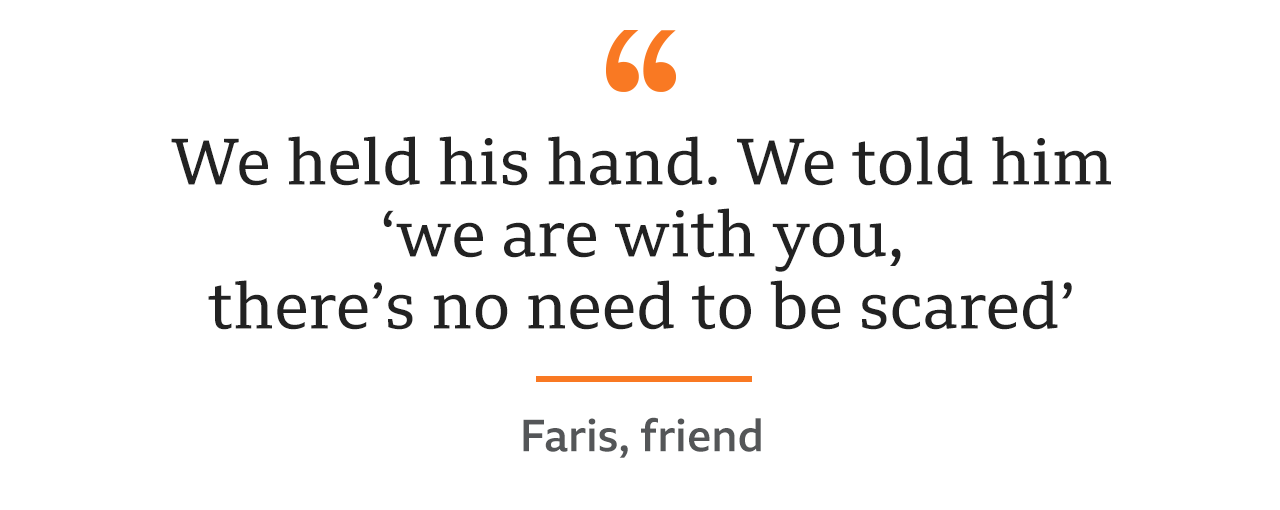
When the group announced they had found another smuggler willing to take them to Italy, Obada called his parents and told them this would be his last attempt at crossing the Mediterranean. If it didn't work, he'd come home.
"We held his hand. We told him, 'We are with you, there's no need to be scared,'" said Faris, as the group climbed on to another inflatable boat in December.
And this time, they succeeded, narrowly. After 22 hours at sea, they were rescued by Italian coastguards off the island of Lampedusa. They were registered by the local authorities, which would make it difficult for them to apply for asylum in any other EU country but Italy. Nevertheless, once they were allowed to go free, they set off from Bologna on the Italian mainland, first to Milan, and then across the border into France.
Nada, meanwhile, was starting to have doubts of his own. The rules for asylum seekers were getting stricter in the UK. He called his brothers again.
"I told [them] to go to Germany, or Italy. Because here, [there are] difficult rules. New rules are very hard for asylum seekers."
But the brothers refused.
In theory, the UK's new Illegal Migration Act, which came into force last July, would now deny Obada any right to claim asylum and to remain in the UK. But in reality, with no agreement yet on where to send those arriving in small boats, Obada would most likely have ended up joining tens of thousands of others in what the Refugee Council has described as "a state of permanent limbo" - living in the UK, but without any clear future.
Nada's brothers continued by train to Paris. They knew no-one in mainland Europe. And Nada was in England, as were many other relatives. Besides, the hardest part of the journey was surely over.
"I want to come here [to the UK] because you are here," Nada remembers Obada telling him. They would stick to their original plan.

And so, in early January, Obada, Ayser and half a dozen Syrian friends arrived in Calais. They pitched tents under a bridge, trying to avoid the French police who would sometimes take the tents and order them to "move on".
The BBC has spoken to a local charity that sought to help the group in Calais. Obada was offered shelter, as a minor, but said he wanted to stay with his brother. The organisation, which is not being named because of the sensitivity of its work, was also in contact with at least two other teenage boys who would go on to board the same boat that Obada tried to take.
A charity representative told us the smugglers in Calais prevented some of these other boys from "deciding for themselves", and that they also felt "under pressure from their families".
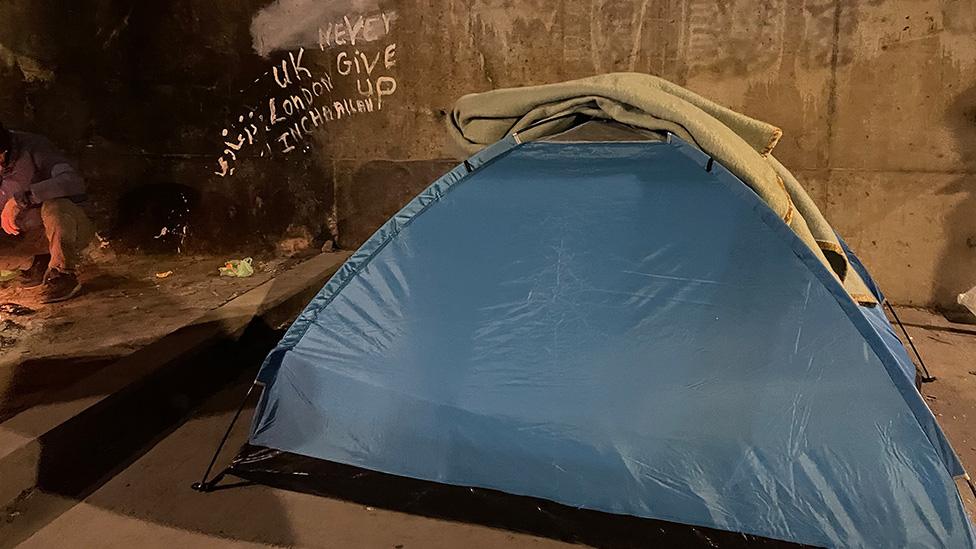
The group pitched their tents under a bridge to avoid the attentions of French police
Speaking about one of the other boys, the representative said: "He phoned us to tell us he was afraid. He told us that it was his parents who forced him (to attempt the crossing)."
After more than a week, the group were told to get ready by Syrian smugglers to whom they had paid €2,000 each to take them to the UK. The forecast was good. They would leave on Saturday night.
The wind had died down along the coast. But the temperature was only just above freezing, and the sea was perhaps 7C.
In the dark, in Wimereux, Obada tried to join the crush of people attempting to board the inflatable as it was moving away from the slipway. But immediately, he and Ayser found they were out of their depth and thrashing around in the cold sea.
"They started screaming and asking for help," said Faris, who had managed to clamber back on to the slipway and was already helping to drag people out of the water. But in the dark, he couldn't make out where Obada was.
"I couldn't see them anymore. They disappeared into the water. The water pulled them, and I couldn't reach them. We didn't know it would be [deep] like this," he said.
French police were on patrol nearby. Extra funding from the UK has enabled France to boost the number of officers in the region, but there still aren't enough to monitor every section of the roughly 150km (93 miles) of coastline now used by the smugglers.
A navy helicopter and a patrol boat arrived at the scene at 02:15. Rescue workers helped treat 20 migrants who were suffering from hypothermia. But Obada was not among them.
"I can still hear it in my head, the screaming, the screaming to death, you could say," recalled Sgt Maj Maxime Menu, who had plunged into the freezing water in another rescue mission in the same area that night.
A few minutes later, Nada received a phone call in London.
"Both of them are gone."
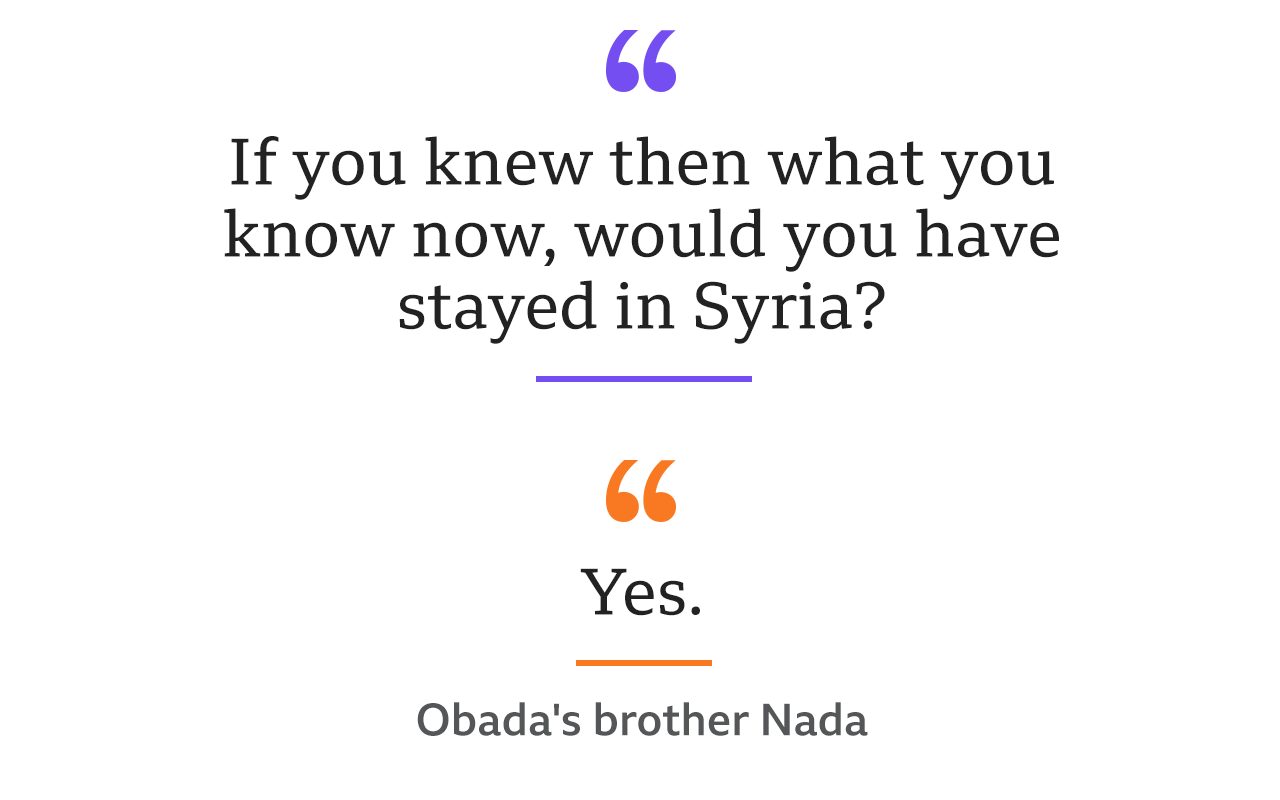
It was another of the Syrians in the group calling. He had managed to get Ayser out of the water first, but too late. And then Obada's body was pulled ashore. Unable to swim, they had both drowned perhaps 10m (11yds) from the slipway.
In his bedsit, Nada crumpled into tears at the memory of answering the call. He began to sob, his chest heaving, then he wiped his eyes.
If you knew then what you know now, would you have stayed in Syria? I asked him.
"Yes. After what happened to Ayser and Obada, I would have stayed in Syria," he replied.
Do you wish Obada had stayed in Syria too?
"Yes."
Do you feel guilty about encouraging him to make the trip.
"Yes. Yes," he said.
The following evening, about 100 locals from Calais and a handful of migrants gathered in the town centre to hold a minute's silence for the five dead and to add Obada's and Ayser's names to a long scroll listing those who have died trying to cross the Channel in recent years.
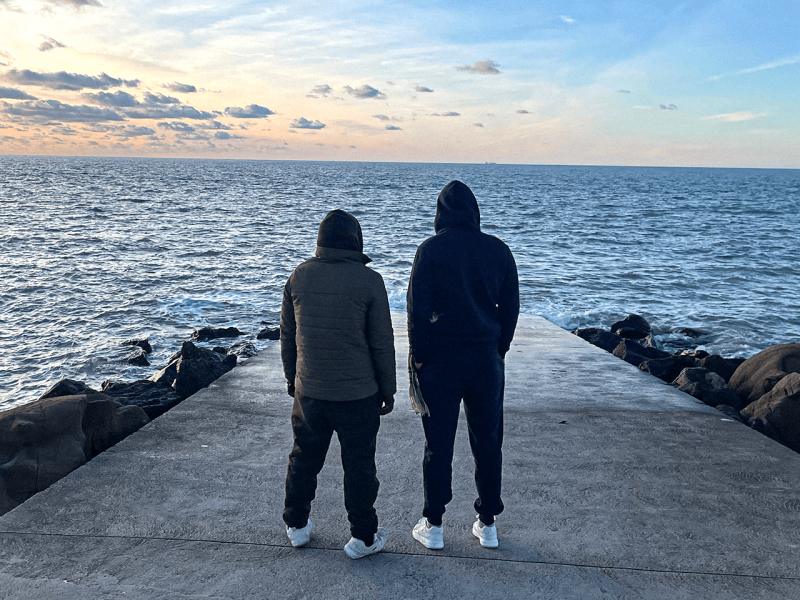
The slipway at Wimereux where the deadly incident took place
"The biggest fault is the laws of Europe who make the life of the refugees impossible. Who give them not any rights. Who make their life here in Calais and all over the borders impossible. And we have to remember that. It is the fault of the European laws," a local French woman told the sombre crowd.
Back in Daraa, Obada's parents sent us a video of their son's empty room.
"We want to see my children for the very last time. This is my one request. The little one was 14 years old. I wish to see him before he is buried," said his mother, Um Ayeser, between sobs.
"I am an ill man. I need oxygen to breathe," said his father, Abu Ayeser.
Obada’s parents sent a video of their son’s empty room
How should Obada's story be judged?
Many people will be inclined to criticise his parents and family for risking the life of a child on such a dangerous journey. Others, not least those with direct experience of life in war zones like Syria, may argue that it is a measure of the family's desperation that they took such a step.
It seems likely that Obada's body, along with his brother's, will be buried in Calais in the coming days. The French authorities said it would not be possible to transport them to the UK, and the costs involved in a shipment back to Syria were, according to Nada, too high to contemplate.

Additional research by Kathy Long and Marianne Baisnee; design by Lilly Huynh, Matt Thomas and Kate Gaynor; production by James Percy and Dominic Bailey
- Published15 January 2024
